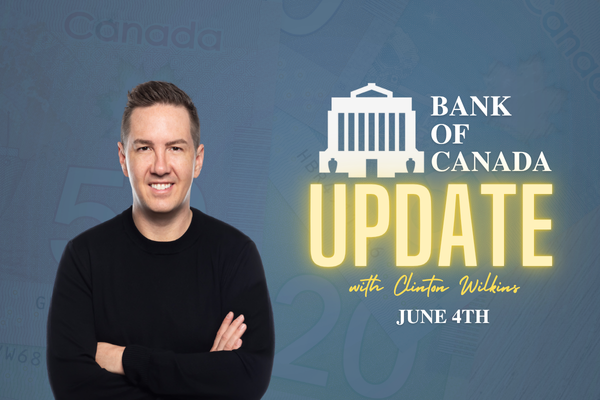Clinton Wilkins joins Todd Veinotte on 95.7 News Radio to discuss The Bank of Canada holding its key policy rate at 2.75%, marking the first pause after seven consecutive cuts.

Bank of Canada – Interest Rates Soften | June 5th
Clinton Wilkins joins Rob Snow on City News to discuss the Bank of Canada’s announcement to cut its overnight interest rate to 4.75%, down from 5%, the level it has maintained since July 2023.
Rob Snow
The Bank of Canada moves lower on the interest rates, is welcome news for mortgage holders, shopping for first mortgage and worried about renewing their current mortgage. Let’s get some analysis on the biggest story in the country today from Clinton Wilkins of the Clinton Wilkins mortgage team Centum Home Lenders in Dartmouth. Thanks for joining us, Clinton, great to hear from you today.
Clinton Wilkins
Thanks for having me.
Rob Snow
What is your reaction to the news from the Bank of Canada? You must be pleased.
Clinton Wilkins
I’m very pleased. I think it’s great news for Canadians. I think it’s great news for anybody who’s looking to become a homeowner. You know, I think the one thing we were saying, and economists were really projecting that the rates were going to go down. The real question was, when were the rates going to soften? I think economists were on the fence leading up to today, on whether there was going to be a rate cut here in June, or whether it was going to be in July when the rates were going to start softening. So, I think it’s a great bout of confidence for consumers. And I think we’re going to see a lot of activity in the market. I do fear that there were some consumers that were sitting on the sidelines with the rates being high. And now with the rates, obviously, softening, we’re gonna see a lot more activity in the market as well.
Rob Snow
Okay, so tell us what this means for for borrowers.
Clinton Wilkins
Any borrowers who are in a variable rate mortgage product, their borrowing costs is going to go down. So, that means that either their interest rate and their payment is going to soften. So, the payment that they make every month is going to be less, or their amortization is going to get shorter, just depending on how their mortgage is set up. For any borrowers that have a home equity line of credit, their cost of borrowing is going to go down. Or if there’s any debt product that’s connected to a bank prime rate, their cost of borrowing is going down, effective today. Now, some lenders will reduce their prime rate at the first of July. So depending on which type of lender the borrower has, it may come into effect right away, or it might be the first of the month.
Rob Snow
When Tiff Macklem was meeting the reporters today in Ottawa, the reporters first few questions was, what about July? What about July? What about July? And Mr. Macklem was like, well, let’s just take things a little bit slow here, one meeting at a time seemed to be his message. But, we’re on the right track. But what would be your expectation for interest rates for the coming months?
Clinton Wilkins
I think my expectation, I think kind of the general consensus with economists are that the rates are going to continue to soften. I expect in July, we’ll also see a reduction in that key rate, which will be great news, I think between now and the end of 2025, I think we’re gonna see interest rates be 2% less than what they are today. The question is, how fast will they come down? And are we going to see consecutive cuts? Meeting after meeting, I can tell you, I’m certainly going to be watching here at the end of July. The next meeting is July 24. So you know, we’re about six weeks away or so from the next announcement.
Rob Snow
Okay, so after today’s news, what our rates going to look like, say for three year and five year products fixed and variable products.
Clinton Wilkins
So there’s not going to be any change to the fixed rate products, the fixed rates move completely independently of the variable rate. And in some cases, some lenders have even increased their fixed rates as of late, some have decreased them. So, there’s always going to be some movement in fixed that has no impact on what’s going on with the variable. A fixed rate is really tied to what’s going on in the bond market. But, for borrowers going to get a variable rate mortgage, those rates are going to be 25 basis points less today. So I think in some instances, especially if a borrower is going to have a high ratio insured mortgage, with the Canadian Mortgage and Housing Corporation, Sagen, or Canada Guarantee, there are some variable rate mortgages now, sub 6%, which is really great news, compared to where even the fixed rates are. And that’s why more and more borrowers are choosing to take a variable. And I would expect Rob now, variable rate mortgage will become even more popular in the coming days and weeks, as consumers believe the rates will continue to soften.
Rob Snow
That was going to be one of my questions, because just given the rate cycle that everybody has been dealing with over the last few years as the Bank of Canada set out on this mission to beat down inflation, whether that meant that borrowers were shying away from variable rate mortgages.
Clinton Wilkins
I think they were you know, I’ve never done so many short term fixed rate mortgages, as I have, you know, in the last couple of years. Certainly a lot of consumers were very nervous of a variable, primarily because the cost was higher than what they could get in a fixed rate. And that’s not normal. You know, historically variable is less and variable rate mortgages were less expensive than effects. But we’re not at a normal time, you know, when we weren’t in normal time with the pandemic, or inflation, or what’s going on in the economy right now. So things are really, I think, on a case by case basis. And I think what a borrower should do is really dependent on their situation, I think more and more borrowers will take the variable with thinking that it’s going to be lower, and some of those borrowers will take the variable because A, they want to break the mortgage early, and it will have the lowest penalty, it’s only three months interest to break a variable rate mortgage early. I think the reason that more borrowers will take a variable today is because they’re going to take a wait and see type approach that they may want to convert into a fixed rate down the road. And anybody who’s in a variable can always convert into a fixed.
Rob Snow
Okay, how’s the spring housing market been like in the Halifax Dartmouth area? How would you describe it?
Clinton Wilkins
I think it’s very steady here, I would describe it more like 2019. And, you know, I think that it’s more of a balanced market. The big challenge and the big news story here in Halifax is, we have a lot more demand in the market than we do supply. I’m sure that’s the same story that we would be telling across this country. But the big thing here in Halifax is we need a lot more construction. And there certainly has been a lot of migration and immigration to Halifax, it’s, you know, the place to be, and there’s not enough housing supply to really keep up with the demand. So we’re still in a seller’s market. But I do think that things are becoming more balanced. Here, I would say it was very much like Ontario over the last couple of years, you know, multiple offers on properties, and you know, properties going for hundreds of thousands of dollars over what their list price is, and buyers entering into Purchase and Sale agreements with no conditions. I think in today’s world, we’re seeing it being more balanced, where there they are putting conditions like financing conditions and inspection conditions. And I mean, that’s best for everyone that is really protecting the buyer and it’s protecting the seller. And I do think that it’s going to be very interesting to see what happens here. You know, this week and really for the rest of the spring going into the summer with this signal from the Bank of Canada.
Rob Snow
Okay. Great to hear from you. We’ll talk again soon Bye bye.!


